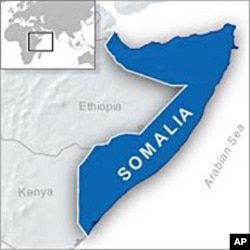Somalia marked 51 years of independence late Thursday with a midnight flag-raising ceremony at the presidential palace in Mogadishu. The government says it was the most peaceful independence ceremony it has ever held, while Somalis in Nairobi ask what there is to celebrate.
July 1 marks the day when two Somali regions, formerly controlled by Britain and Italy, merged together to form the nation of Somalia.
For the past 20 years, nearly half of its lifespan, the country has been without a functional central government, and there has been little to celebrate.
But, according to the government, all was well at a midnight flag raising ceremony at the presidential palace in Mogadishu.
Abdirahman Yarisow, the spokesperson for new Prime Minister Abdiweli Mohamed Ali, said due to recent advances against the militant group al-Shabab, it was the most peaceful ceremony in years.
“Last night was very much different. This shows that the city is more peaceful than before. People were traveling after midnight, one’ o clock, going back to their homes," Yarisow said. "The streets were lit this time with special lights to mark the Independence day of Somalia, and this is the first time the local administration organized this so beautifully.”
Yarisow said the Prime Minister acknowledged at the ceremony the hardships that remain for Somalia, but was optimistic about the future of the government.
On the streets of Nairobi, members of the Somali diaspora have a different point of view. Omar Abdi, 21, has only ever known a Somalia mired in violence and disfunction.
"I have not seen a flag, or nationhood. I have not seen a government, any
rule of law," said Abdi. "I grew up seeing people killing each other ... one can talk about nationhood when you have seen it, I know nothing about nationhood."
Often referred to in the media as a “failed state” Somalia frequently tops the list of the world’s poorest and most dangerous nations. The country’s transitional government is not only fighting al-Shabab, it is also contending with a severe drought that has already displaced tens of thousands of people.
One man, Weli Diriye, who identified himself as a member of the Democratic Party of Somalia, said there is hope for the country, but it lies with the politicians.
"I would like to request," said Diriye, "whoever want to be a leader, to come up
with political party, put down your arms, and compete [using political
parties] if you are elected you can lead, if you won’t be elected, you
cannot be someone [a leader] by carrying gun."




